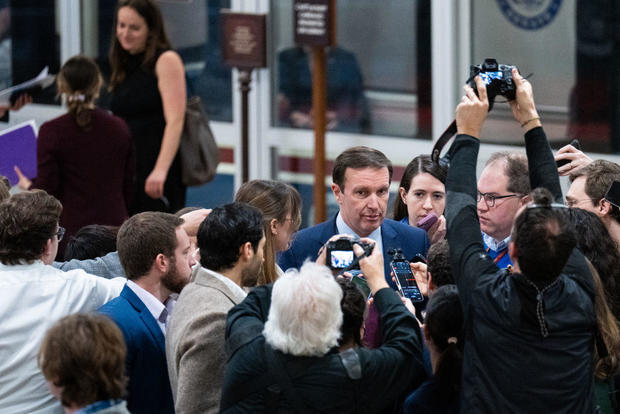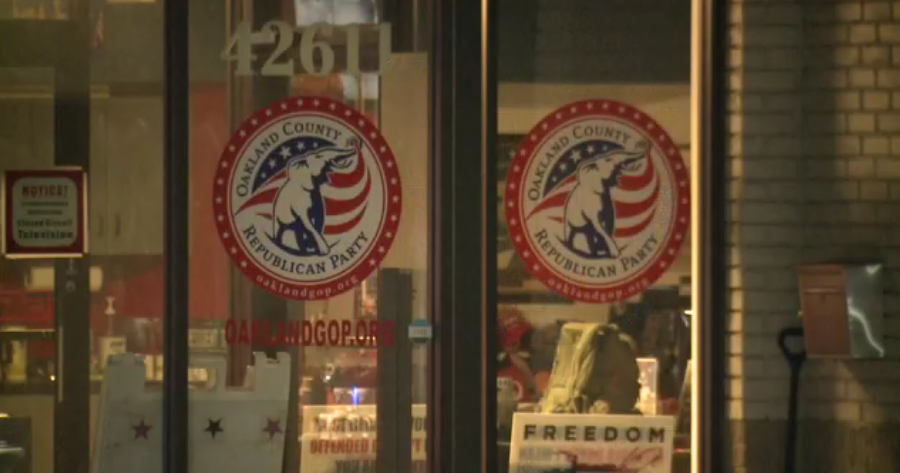Senate immigration talks continue as divisions among Republicans threaten to sink deal
Washington — White House and Senate negotiators have continued their weeks-long border policy negotiations aimed at forging a compromise on unresolved issues like the immigration parole authority, though divisions among Republicans threaten to derail the effort, people directly familiar with the talks told CBS News.
Republican leaders are also trying to gauge how much GOP support for a border security agreement with Democrats has shifted, now that former President Donald Trump has solidified his position as the front-runner for the party's presidential nomination.
On Thursday, Trump attacked a border deal as a "gift" to the Democrats.
In a closed-door meeting with Republicans on Wednesday, Senate Minority Leader Mitch McConnell acknowledged the political dynamics on immigration have changed, given that Trump wants to make the situation at the border one of the key issues of his campaign. Some of McConnell's colleagues interpreted his comments as him backing away from an eventual deal, which is being negotiated by GOP Sen. James Lankford, Democrat Chris Murphy and independent Kyrsten Sinema.
But senators emerging from a GOP lunch on Thursday said McConnell had clarified his stance. Sen. Mitt Romney of Utah said the GOP leader "made it crystal clear that he's supportive of the work that James Lankford has been doing."
"The ambiguity that was around for the last few hours has been clarified for all of us. He's fully behind the border bill, fully behind the support for Ukraine, and is not going to let political considerations of any campaign stand in the way of his support," Romney said. "Leader McConnell removed any question about his support. He said he is fully supportive of the border bill as he indicated for the last several weeks."
But on the same day Trump took to social media to criticize a potential agreement, posting: "A Border Deal now would be another Gift to the Radical Left Democrats. They need it politically, but don't care about our Border. What is currently being worked on in the Senate will be meaningless in terms of Border Security and Closure."
Trump went on to attack the Biden administration for demanding that Texas allow Border Patrol agents full access to a crossing point in the border town of Eagle Pass. "We need a Strong, Powerful, and essentially 'PERFECT' Border and, unless we get that, we are better off not making a Deal, even if that pushes our Country to temporarily 'close up' for a while, because it will end up closing anyway with the unsustainable Invasion that is currently taking place," Trump wrote.
Three sources familiar with the immigration discussions had earlier told CBS News that Republicans did not have a clear idea of what Trump wants regarding a potential congressional border deal, nor has he been briefed on the agreement being negotiated.
GOP Sen. Lindsey Graham of South Carolina, a Trump ally, is part of the group pressing for a deal, and has publicly said that he doesn't think Republicans will be able to reach a better agreement with Democrats if Trump is reelected.
Murphy, a Connecticut Democrat, told reporters at the Capitol on Thursday that Republicans are "going to make a decision in the next 24 hours as to whether they actually want to get something done, or whether they want to leave the border a mess for political reasons."
"I think what is very scary to some Republicans is that the deal we have reached will actually fix a big part of the problem. And I know for Donald Trump and some Republicans, it's not in their best interest for there to be policy changes that actually fix the broken asylum system, or give the president new tools to better manage the border," he said. "And so, as Republicans have seen the deal, some of them are worried that it actually will fix the problem."
Two sources familiar with the negotiations told CBS News that Republican Sens. Ted Cruz of Texas and Mike Lee of Utah have raised objections to a deal. Cruz told reporters on Wednesday that the chances of the Senate agreement passing the House "are 0.000%." It is still not clear what House Speaker Mike Johnson wants to do, though he has insisted that any aid to Ukraine would need to be linked to a potential border deal in order to pass.
During a visit to the Texas border town of Eagle Pass earlier in January, Johnson told "Face the Nation" that he did indeed want a congressional border deal but acknowledged he was not party to the negotiations or read-in on what the Senate had been crafting.
"We want to solve this crisis. We have to — we have a moral obligation to do so," Johnson said. He pressed President Biden to use executive authority before Congress changed any laws.
Last week, Mr. Biden was asked by reporters if the border was secure and responded, "No, it is not." He said he has not believed the border to be secure for the last 10 years, and said his administration has been requesting funding from Congress for some time. "Give me the money," he said to a group of White House reporters.
In recent days, a handful of House Republicans from Texas, including Tony Gonzales and Mike McCaul, along with Texas Democrat Henry Cuellar, visited Mexico for consultations with Mexican presidential candidates as well as the current government.
The White House and the small group of senators involved in the negotiations have agreed on some provisions, like creating an authority to expel migrants when border agents record a spike in illegal crossings, making asylum screenings harder to pass and expanding the expedited removal process. But the parole policy has continued to divide them, sources said.
The negotiators have discussed several potential changes to the parole authority, which the Biden administration has used at an unprecedented scale to resettle refugees from Afghanistan and Ukraine, as well as hundreds of thousands of Latin American migrants. It has allowed those migrants to live and work in the U.S. legally, but only on a temporary basis. Republican lawmakers have argued the administration has abused the authority.
Those proposals discussed by the White House and Senate negotiators include numerical caps on parole grants, barring migrants with parole status from asylum and limiting the use of the authority at land borders, sources briefed on the talks said. A person familiar with the talks said the White House is not considering disqualifying migrants paroled into the country from asylum.
Alan He contributed reporting.






